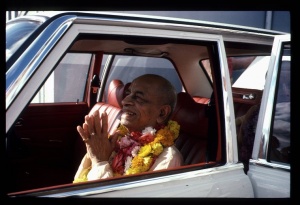CC Madhya 23.55 (1975): Difference between revisions
(Vanibot #0027: CCMirror - Mirror CC's 1996 edition to form a basis for 1975) |
(Vanibot #0020: VersionCompareLinker - added a link to the Version Compare feature) |
||
| Line 2: | Line 2: | ||
<div style="float:left">'''[[Sri Caitanya-caritamrta (1975)|Śrī Caitanya-caritāmṛta (1975)]] - [[CC Madhya (1975)|Madhya-līlā]] - [[CC Madhya 23 (1975)|Chapter 23: Life's Ultimate Goal — Love of Godhead]]'''</div> | <div style="float:left">'''[[Sri Caitanya-caritamrta (1975)|Śrī Caitanya-caritāmṛta (1975)]] - [[CC Madhya (1975)|Madhya-līlā]] - [[CC Madhya 23 (1975)|Chapter 23: Life's Ultimate Goal — Love of Godhead]]'''</div> | ||
<div style="float:right">[[File:Go-previous.png|link=CC Madhya 23.54 (1975)|Madhya-līlā 23.54]] '''[[CC Madhya 23.54 (1975)|Madhya-līlā 23.54]] - [[CC Madhya 23.56 (1975)|Madhya-līlā 23.56]]''' [[File:Go-next.png|link=CC Madhya 23.56 (1975)|Madhya-līlā 23.56]]</div> | <div style="float:right">[[File:Go-previous.png|link=CC Madhya 23.54 (1975)|Madhya-līlā 23.54]] '''[[CC Madhya 23.54 (1975)|Madhya-līlā 23.54]] - [[CC Madhya 23.56 (1975)|Madhya-līlā 23.56]]''' [[File:Go-next.png|link=CC Madhya 23.56 (1975)|Madhya-līlā 23.56]]</div> | ||
{{CompareVersions|CC|Madhya 23.55|CC 1975|CC 1996}} | |||
{{RandomImage}} | {{RandomImage}} | ||
==== TEXT 55 ==== | ==== TEXT 55 ==== | ||
<div class="verse"> | <div class="verse"> | ||
:sakhya-vātsalya-rati pāya | :sakhya-vātsalya-rati pāya 'anurāga'-sīmā | ||
:subalādyera | :subalādyera 'bhāva' paryanta premera mahimā | ||
</div> | </div> | ||
| Line 18: | Line 17: | ||
<div class="synonyms"> | <div class="synonyms"> | ||
sakhya—in friendship; vātsalya—in | sakhya—in friendship; vātsalya—in paternal affection; rati—affection; pāya—obtains; anurāga-sīmā—up to the limit of subordinate spontaneous love; subala-ādyera—of friends like Subala and others; bhāva—ecstatic love; paryanta—up to; premera mahimā—the glory of the love of Godhead. | ||
</div> | </div> | ||
| Line 25: | Line 24: | ||
<div class="translation"> | <div class="translation"> | ||
"After the mellow of servitorship, there are the mellows of friendship and paternal love, which increase to subordinate spontaneous love. The greatness of the love found in friends like Subala extends to the standard of ecstatic love of Godhead. | |||
</div> | </div> | ||
| Line 32: | Line 31: | ||
<div class="purport"> | <div class="purport"> | ||
Śrīla Bhaktisiddhānta Sarasvatī Ṭhākura says that the mellow of neutrality increases to simple love of Godhead. In the mellow of servitorship, love of Godhead increases beyond that to affection, | Śrīla Bhaktisiddhānta Sarasvatī Ṭhākura says that the mellow of neutrality increases to simple love of Godhead. In the mellow of servitorship, love of Godhead increases beyond that to affection, counter-love (anger based on love), love and attachment. Similarly, the mellow of friendship increases to affection, counter-love, love, attachment and subattachment. It is the same with the mellow of paternal affection. The special feature of the mellow of friendship exhibited by personalities like Subala is that it increases from fraternal affection to counter-love, to spontaneous attachment, to subordinate attachment, and finally to the ecstasy where all the ecstatic symptoms continuously exist. | ||
</div> | </div> | ||
Latest revision as of 14:51, 27 January 2020

A.C. Bhaktivedanta Swami Prabhupada
TEXT 55
- sakhya-vātsalya-rati pāya 'anurāga'-sīmā
- subalādyera 'bhāva' paryanta premera mahimā
SYNONYMS
sakhya—in friendship; vātsalya—in paternal affection; rati—affection; pāya—obtains; anurāga-sīmā—up to the limit of subordinate spontaneous love; subala-ādyera—of friends like Subala and others; bhāva—ecstatic love; paryanta—up to; premera mahimā—the glory of the love of Godhead.
TRANSLATION
"After the mellow of servitorship, there are the mellows of friendship and paternal love, which increase to subordinate spontaneous love. The greatness of the love found in friends like Subala extends to the standard of ecstatic love of Godhead.
PURPORT
Śrīla Bhaktisiddhānta Sarasvatī Ṭhākura says that the mellow of neutrality increases to simple love of Godhead. In the mellow of servitorship, love of Godhead increases beyond that to affection, counter-love (anger based on love), love and attachment. Similarly, the mellow of friendship increases to affection, counter-love, love, attachment and subattachment. It is the same with the mellow of paternal affection. The special feature of the mellow of friendship exhibited by personalities like Subala is that it increases from fraternal affection to counter-love, to spontaneous attachment, to subordinate attachment, and finally to the ecstasy where all the ecstatic symptoms continuously exist.